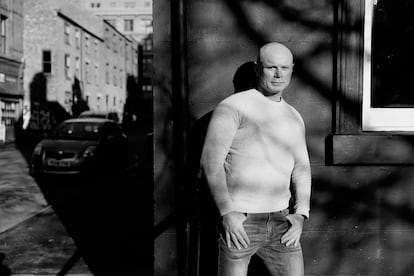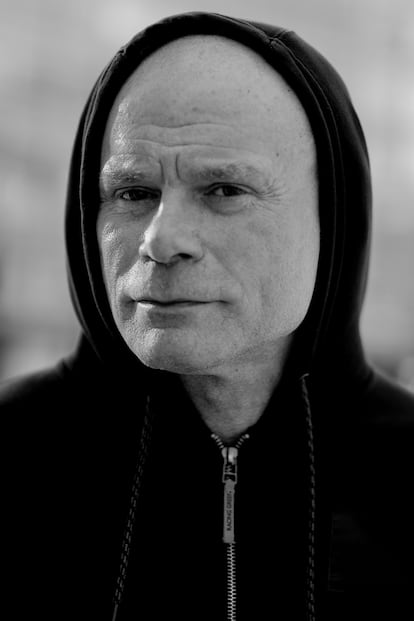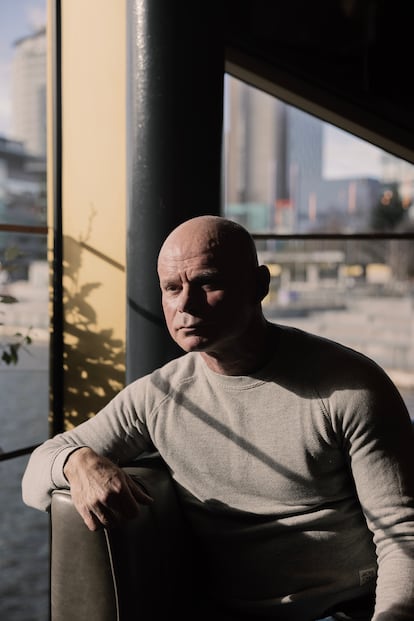Mark Simpson, creator of the term ‘metrosexual’: ‘Love for the male body is no longer exclusive to gay men’
In 1994, British journalist Mark Simpson coined the term ‘metrosexual,’ which referred to those heterosexual guys who took care of themselves, loved shopping and were able to show admiration for the beauty of other men. 30 years later, EL PAÍS meets up with Simpson to discuss how the masculine universe has changed, from David Beckham and Mark Wahlberg, to Cristiano Ronaldo and Harry Styles

Contrary to conventional wisdom, the revolution doesn’t devour its children, but rather its parents.
In 1994, Mark Simpson — now 58 — labelled all those young men who had begun to take care of their skin, their hair, their clothes and their esthetics, with the undisguised purpose of being admired and awakening the desire of women… and men. “Metrosexuals” is what he called them. Later, in a second article on the subject, in 2003, he selected an image with which to identify them: David Beckham.
“In the [British] men’s magazines of the 1990s — such as Loaded or FHM — there was already this whole culture of admiration for the beauty of the male body. [There were lots of] advertisements for creams, colognes and clothing. But [the magazines] also wanted to make it clear that they weren’t gay. And the way that you do that in British culture is to have lots of football (soccer),” Simpson explains.
He has accepted a meeting with EL PAÍS in Manchester, a city in the north of England that he has a special connection with. He’s happy to walk, chat, take part in a disciplined photo shoot and go over the evolution of male beauty since he launched that photo into the world.
The revolution devours its parents… and Simpson — a gay man, a cultural critic and a hilariously ironic analyst of British sexual life — admits that he’s beginning to feel the teeth of time closing in on his shaved neck.

Years after the appearance of the term ‘metrosexual,’ Simpson detected — and also named — the second generation: the spornosexual (a complex combination of sports, pornography and sexuality). This referred to a new type of man, who spends hours in the gym, shapes his body with extreme dedication and protein reinforcement, and has no complex understanding that his image is both his signature and his main asset to function in the world. The icon of this new era of spornosexuals was Cristiano Ronaldo.
“Beckham never really looked like he went to the gym. You know, he was athletic, but he didn’t really have a commodified body in the way that sports stars often have today. The reason Beckham was so significant was because he was a footballer… a great footballer [and model] at the top of his game, who acted like he was gay, when he wasn’t,” Simpson recalls.
We ask Simpson about the effect that social media has had on the categories of “metrosexual” and “spornosexual.”
“Today, we live in a visual world, in which everyone has become a commodity,” Simpson notes. “And, as the father of metrosexuality, I can’t really complain about this,” he admits.
Being a gay man who grew up in the rough north of England — who woke up to his sexuality in the early-1980s and who has long played with provocation and irreverence in all his articles — there’s something about how generation Z is so relaxed about its own beauty that baffles him. “Normally, when I go to the gym, I can barely use the mirror in the locker room. There are usually around 15 guys in front of me, in their shorts, flexing, taking selfies, comparing abs, touching their muscles… they’re having a great time,” he says.

Does he see an excess of vanity in this?
“No, actually, I even feel a certain level of satisfaction,” he clarifies. “They’ve been able to adapt to a world that’s very Darwinian, in which you must use everything at your disposal to attract attention. In other words, you gotta do whatever it takes not to disappear. The worst thing that can happen to you now is to become invisible,” he warns.
Simpson remembers the first advertisement for Calvin Klein underwear that came out 20 years ago, which starred Mark Wahlberg (then a rapper) and Kate Moss. Wahlberg constantly grabbed his genitals… something that rappers did at the time. “The creators of the ad — and the Calvin Klein brand itself — had to work quite hard to assert Mark Wahlberg’s heterosexuality,” the journalist recalls.
Earlier this year, Calvin Klein presented its spring 2024 collection of men’s underwear with a campaign starring Jeremy Allen White, the star of successful series such as The Bear or Shameless. In the promotional video, he takes off his tank top and blue shorts as he climbs to the rooftop of a Manhattan building. The actor displays a statuesque body as he contorts against the background of skyscrapers. The camera shows low angle shots, with Allen White keeping his lips parted throughout the entire sequence (in a display of sensuality), until he falls exhausted on a sofa, with the indolence of a teenager, protecting his eyes from the sun with his forearm.
The impact on social media generated a value of $12.7 million in just 48 hours, according to Launchmetrics, a company dedicated to measuring advertising returns. “With that campaign, there was no longer any need to assert [Allen White’s] straightness or normality or whatever… all of that was taken for granted. It was an immediate success. But the flip side is that the impact of this campaign has been ephemeral, it only lasted a couple of weeks,” Simpson notes.
Meanwhile, the one between Wahlberg and Moss became a legend.
“Exactly,” he agrees, “the media didn’t stop discussing and debating [that ad campaign] for years. It was a sensation that’s difficult to repeat today.”

Another generational icon who Simpson has studied is Harry Styles, an artist who seeks an ideal of beauty that’s both vain and virile at the same time. He’s also a model who emerged from the working class. “Many people imagined metrosexuality as representing the middle class, you know? Because it implied that you had to have money,” the journalist explains. “But that’s not necessarily how it works, especially in the British context. The famous Teddy Boys of the 1950s were working-class guys who saved all their money to buy tailored suits and colorful vests, or get a haircut and quiff. For the middle class, they symbolized vulgar taste.”
The Teddy Boys were inspired by the styles worn by dandies in the Edwardian period, in the first decade of the 20th century. They wanted to pay homage to the gentleman who had their suits custom-made by the tailors on London’s Saville Row, competing with each other to see who was the most elegant. “If you don’t have property or capital, your weapon is yourself. And the way to rebel — to show that your body isn’t simply a tool to work and produce — is to show off. David Beckham was also working-class. The world of football is that of the working class,” he emphasizes.
But can Harry Styles also be a canon of male beauty?
“Yes, of course,” Simpson affirms. “He represents a new opening. [But] I think that his career seems to me to be a little bit confected… it kind of seems to be styled in a way that harks back to David Bowie or whoever, in a way that I don’t find particularly interesting. He does represent something larger, which is that male beauty is no longer something forbidden,” the journalist admits.
He’s very careful not to enter into the mud of the debate on gender identities, an issue that he has great respect for. But he celebrates at least one new societal shift: “There’s been a breakdown in certainties about sexuality and gender. There was the idea of traditional masculinity — which was basically heterosexuality, with all the characteristics that it incorporated — and ‘abnormality,’ which was really just homosexuality. But for the younger generation, these basic ideas of monosexuality have been totally left behind.”

When asked if there’s still a canon of male beauty, Simpson replies that “the rupture of all these identities, assumptions and certainties has meant that male beauty is no longer something coherent, but rather fractured and fragmented.”
“It no longer makes sense to identify someone as metrosexual,” he adds. “I did it in 2003 because people were still in denial, unable to assimilate what was happening around them. Today, it’s absurd to highlight it because it’s simply [the norm today].”
In 2015, Simpson recalls, Ford launched a provocative ad for its Ecosport model that showcased the vehicle’s innovative keyless entry. A sensor detected the proximity of the key and the doors were unlocked. A male model emerged from the sea, wearing a tight blue swimsuit: he headed towards his car. As he walked through the beach, he attracted the eyes of women and men, young and old. “Logic leads you to think that everyone was wondering where he kept the keys,” Simpson smiles. In fact, the ad’s slogan was: “Where you keep your key is up to you”
“But the relevant thing,” Simpson points out, “is that everyone was looking at the swimmer’s beautiful body. And the ad ends with a close-up of his muscular butt. The male body has become a feast for the eyes… and everyone is invited.”
Does Simpson think that there’s room today for the beauty of a Ben Whishaw, or an Andrew Scott? Does that kind of intellectual softness still have appeal?
“I hope so,” he sighs. “But I fear we live in superficial times. It’s evident that beauty manifests itself in many forms, not only in those that manage to succeed on Instagram. But it’s a pretty unforgiving world. Maybe I’ve lived too long, but all this beauty can be ugly.”

The evolution of the relationship between men and their image has turned the traditional scenario upside down. An entire generation has chosen to objectify their bodies and, in doing so, they’ve destroyed the idea that this objectification can take away your power. “On the contrary, they’ve discovered all the power that’s contained in the possibility of attracting people’s interest and seducing them,” Simpson notes. “The older man in me finds it terrifying. But, at the same time, I see how they’ve turned it into something social… it’s not meant to be alienating, [it’s not] good or bad. It’s just something necessary for survival.”
“Above all, what has happened is that a younger generation of men has discovered their love for the male body… something that, until recently, was pathologized. [That love] isn’t solely the property of gay men anymore.”
Provocative and ironic, kind and complicit, Simpson staunchly defends the display of muscles on social media.”What some call ‘vulgarity’ in the British context, I call feeling alive,” he says with a wink.
Sign up for our weekly newsletter to get more English-language news coverage from EL PAÍS USA Edition
Tu suscripción se está usando en otro dispositivo
¿Quieres añadir otro usuario a tu suscripción?
Si continúas leyendo en este dispositivo, no se podrá leer en el otro.
FlechaTu suscripción se está usando en otro dispositivo y solo puedes acceder a EL PAÍS desde un dispositivo a la vez.
Si quieres compartir tu cuenta, cambia tu suscripción a la modalidad Premium, así podrás añadir otro usuario. Cada uno accederá con su propia cuenta de email, lo que os permitirá personalizar vuestra experiencia en EL PAÍS.
¿Tienes una suscripción de empresa? Accede aquí para contratar más cuentas.
En el caso de no saber quién está usando tu cuenta, te recomendamos cambiar tu contraseña aquí.
Si decides continuar compartiendo tu cuenta, este mensaje se mostrará en tu dispositivo y en el de la otra persona que está usando tu cuenta de forma indefinida, afectando a tu experiencia de lectura. Puedes consultar aquí los términos y condiciones de la suscripción digital.









































